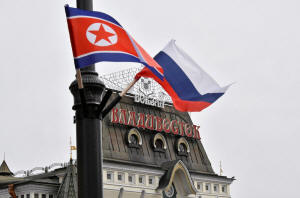Russia and North Korea forge closer ties amid shared isolation
 Send a link to a friend
Send a link to a friend
 [July 27, 2023]
By Josh Smith [July 27, 2023]
By Josh Smith
SEOUL (Reuters) - Russia's defence minister was photographed this week
viewing banned North Korean ballistic missiles with leader Kim Jong Un
at a military expo in Pyongyang, signalling deeper ties between the two
countries as they face off with the United States.
As Russia's isolation over its war in Ukraine has grown, it has seen
increasing value in North Korea. For North Korea's part, relations with
Russia haven't always been as warm as they were during the heady days of
the Soviet Union, but now the country is reaping clear benefits from
Moscow's need for friends.
Here's how North Korea-Russia relations began, and how they are becoming
closer:
POLITICAL BACKING
Communist North Korea was formed in the early days of the Cold War with
the backing of the Soviet Union. North Korea later battled the South and
its U.S. and United Nations allies to a stalemate in the 1950-1953
Korean War with extensive aid from China and the Soviet Union.
North Korea was heavily reliant on Soviet aid for decades, and when the
Soviet Union collapsed in the 1990s, it contributed to a deadly famine
in the North.
Pyongyang's leaders have tended to try to use Beijing and Moscow to
balance each other. North Korean leader Kim Jong Un initially had a
relatively cool relationship with Russia and China, which both joined
the United States in imposing strict sanctions on North Korea over its
nuclear tests.

After his country's last nuclear test in 2017, Kim took steps to repair
ties.
He met Russian President Vladimir Putin in 2019 for the first time in a
summit in the Russian city of Vladivostok.
In October, Kim sent a birthday greeting to Putin, congratulating him
for "crushing the challenges and threats of the United States".
In a message for Russia's National Day in June, Kim vowed to "hold
hands" with Putin and bolster strategic cooperation.
Russia has joined China in opposing new sanctions on North Korea,
blocking a U.S.-led push and publicly splitting the U.N. Security
Council (UNSC) for the first time since it started punishing Pyongyang
in 2006.
UKRAINE WAR SUPPORT
North Korea has reciprocated with public support for Moscow after Russia
invaded Ukraine. It was one of the only countries to recognise the
independence of breakaway Ukrainian regions, and it expressed support
for Russia's proclaimed annexation of parts of Ukraine.

[to top of second column]
|

State flags of Russia and North Korea
fly in a street near a railway station during the visit of North
Korea's leader Kim Jong Un to Vladivostok, Russia April 25, 2019.
REUTERS/Yuri Maltsev/File Photo

The United States has accused North Korea of providing arms to
Russia for the war effort, including a "significant" number of
artillery shells, as well as a shipment of infantry rockets and
missiles to the private Russian military company, the Wagner Group.
Both Russia and North Korea have denied those claims, but this week
promised to deepen defence cooperation.
"Moscow's 'special military operation' in Ukraine has ushered in a
new geopolitical reality in which the Kremlin and (North Korea) may
become increasingly close, perhaps even to the point of resurrecting
the quasi-alliance relationship that had existed during the Cold
War," Artyom Lukin, a professor at Far Eastern Federal University in
Vladivostok, wrote in a report for 38 North.
It is notable Pyongyang has begun using the new phrase "tactical and
strategic collaboration" to describe its relationship with Russia,
he added.
ECONOMIC TIES
Last year, Russia and North Korea restarted train travel for the
first time since railway journeys were cut during the COVID pandemic
with an unusually opulent cargo - 30 grey thoroughbred horses.
Shortly after that Russia also resumed oil exports to North Korea,
United Nations data shows, the first such shipments reported since
2020.
The vast majority of North Korea's trade goes through China, but
Russia is a potentially important partner as well, particularly for
providing oil, experts said. Moscow has denied breaking U.N.
sanctions, but Russian tankers have been accused of helping evade
caps on exporting oil to North Korea and sanctions monitors have
reported laborers remain in Russia despite a ban.

Russian officials have openly discussed "working on political
arrangements" to employ 20,000 to 50,000 North Korean laborers,
despite U.N. Security Council resolutions that ban such
arrangements.
Russian officials and leaders in the breakaway regions in Ukraine
have also discussed the possibility of having North Korean workers
help rebuild those war-torn areas.
(Reporting by Josh Smith; Editing by Lincoln Feast)
[© 2023 Thomson Reuters. All rights
reserved.]This material may not be published,
broadcast, rewritten or redistributed.
Thompson Reuters is solely responsible for this content. |